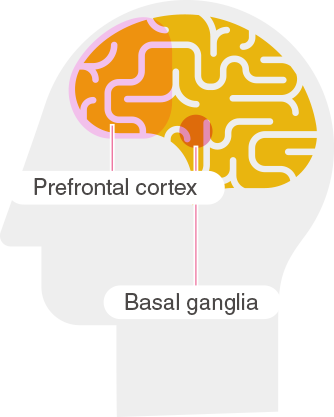What causes ADHD?
 ADHD is a complex and heterogeneous disease. This means that different people may have different symptoms, with different underlying causes.
ADHD is a complex and heterogeneous disease. This means that different people may have different symptoms, with different underlying causes.
With no single cause identified, genetic and environmental factors are thought to play a part in the condition, but our understanding is still incomplete.
Research shows that ADHD tends to run in families. You may wish to discuss this with your family; do you know if anyone in the family has ADHD or may show some of the symptoms but has not been diagnosed?
Environmental factors may include pregnancy/early childhood risk factors (e.g. premature birth, low birth weight or prenatal tobacco exposure), socioeconomic risk factors (e.g. single parent household, paternal history of antisocial behaviour, maternal depression, lower maternal education, lower social class or households of social welfare recipients), or environmental contaminants (e.g. lead exposure).
Research has also shown important differences between the brains of people with and without ADHD. Brain areas affected by ADHD include those involved in:
- planning and carrying out tasks
- inhibiting excessive movement
- shifting focus
- reward and motivation
 We can think of brain connections like the signal on a mobile phone. When the signal is strong, messages can easily get through but if the signal is weak, the message fails to send.
We can think of brain connections like the signal on a mobile phone. When the signal is strong, messages can easily get through but if the signal is weak, the message fails to send.
Neurotransmitters are chemicals that are used to pass messages between brain cells. Two neurotransmitters called noradrenaline and dopamine normally connect the prefrontal cortex (responsible for planning and starting and carrying out tasks) and the basal ganglia (responsible for impulse control and coordinating information). In ADHD, levels of some of these chemicals are altered, which disrupts the connections and networks in the brain. This makes it difficult for people with ADHD to concentrate or pay attention.

Useful Links
Patient support organisations
- ADHD Foundation – Adults – https://adhdfoundation.org.uk/
- ADHD Solutions – https://www.adhdsolutions.org/
- The National Attention Deficit Information and Support Service (ADDISS) – https://www.addiss.co.uk
- Scottish ADHD coalition – https://www.scottishadhdcoalition.org
Professional organisations
- UK Adult ADHD Network (UKAAN) – https://www.ukaan.org
- National Health Service – Overview ADHD – https://www.nhs.uk/conditions/attention-deficit-hyperactivity-disorder-adhd/
- Royal College of Psychiatrists – ADHD in adults – https://www.rcpsych.ac.uk/mental-health/problems-disorders/adhd-in-adults
- National Institute for Health and Care Excellence (NICE) guideline NG87 – Information for the public – https://www.nice.org.uk/guidance/ng87/informationforpublic
You are now leaving www.adhdandyou.co.uk. You will be re-directed to an external website. Takeda accepts no responsibilty for the content of other websites.